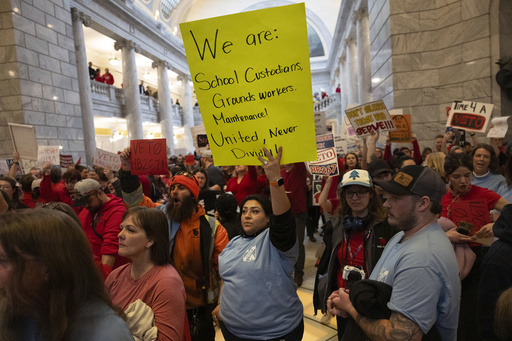SALT LAKE CITY — The Governor of Utah has enacted a law that restricts collective bargaining for public sector unions, a move that is deemed by analysts as one of the most stringent labor regulations in the nation. This legislation, which will take effect on July 1, prohibits unions representing teachers, firefighters, police personnel, transit workers, and other public servants from negotiating for improved wages and working conditions on their behalf.
The decision by Governor Spencer Cox was announced on Friday evening after a week filled with protests from thousands of union members—both from public and private sectors—who gathered outside his office, urging him to veto the bill. The measure was narrowly approved by the Republican-led Legislature last week after its sponsors retracted a compromise proposal that would have only partially restricted bargaining rights.
In his statement regarding the bill, Governor Cox expressed disappointment over the lack of a compromise that had previously been within reach. “I’m disappointed that, in this case, the process did not ultimately deliver the compromise that at one point was on the table and that some stakeholders had accepted,” he said.
The bill’s passage did not meet veto-proof thresholds, meaning that had Cox chosen to reject it, proponents would have needed additional backing to override his veto. This legislation positions Utah alongside North and South Carolina as states with the most severe restrictions on public sector unions, as noted by labor expert John Logan from San Francisco State University.
Educators, who often rely on collective bargaining, view this law as an effort by Republican lawmakers to diminish the political sway of teachers’ unions and facilitate their own education policies. The GOP supporters of the bill contended that it would enable employers to interact directly with all employees rather than through union representatives.
The Utah Education Association, the largest union for public education employees in the state, has criticized the governor for disregarding the significant opposition from workers who urged a veto. The union is contemplating a potential ballot referendum to challenge the law, although such an initiative would incur substantial costs.
“Despite overwhelming opposition, Governor Spencer Cox and the Legislature ignored the voices of thousands,” the union stated. “This is a blatant attack on public employees and our right to advocate for the success of our profession and students.”
Furthermore, Governor Cox’s latest actions come amid widespread changes happening at the federal level, including efforts by former President Donald Trump to reduce funding for the U.S. Department of Education, along with urging employees to resign.
Additionally, on the same day, the governor signed another piece of legislation that prohibits transgender college students from residing in dormitories that align with their gender identity. Moving forward, students at public colleges and universities in Utah will be restricted to living in or accessing gendered spaces—including dorms, bathrooms, and locker rooms—that correspond to the sex they were assigned at birth. This law marks a significant restriction related to university housing, although some other states have broader bathroom regulations that could extend the impact to dormitories.




